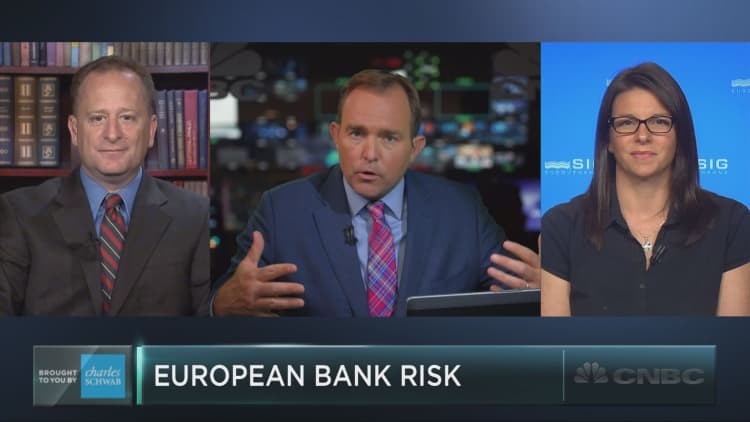
Banks across Europe have endured a choppy year, to say the least, and some experts say the effect on U.S. stocks is forthcoming.
Deutsche Bank hit an all-time low on Wednesday. Major Italian bank Banca Monte dei Paschi di Siena received a poor rating in a stress test earlier this week. And , Italy's largest bank, saw its shares fall after results were relatively weak.
"It really is a disaster with these banks. I'll give you a good example: The IMF called Deutsche Bank the most dangerous bank in the world," Eddy Elfenbein, editor of the blog Crossing Wall Street, said Wednesday on CNBC's "Trading Nation." He added that turmoil across European banks "very well may" send shockwaves to international markets.
Elfenbein was referring to a report published by the International Monetary Fund in June noting that the key German bank, among the globally systemically important banks, "appears to be the most important net contributor to systemic risks, followed by HSBC and Credit Suisse."
"Right now it's going for about a quarter of its book value; it's just a mess we see out there, these European banks. They have bad loans, bad assets, and they're not nearly capitalized like they ought to be," said Elfenbein.
He said the contributors to challenges faced by many European banks include troubling stress tests, which measure the resilience of banks in the case of hypothetical financial crises, risks associated with contagion, and, of course, Britain's decision to leave the European Union, which sent the pound plummeting to 30-year lows.
More generally, low rates are imperiling banks' core means of making money. That situation actually worsened Thursday, as the Bank of England cut rates, sending British bond yields plummeting.
At some point, the European banks are going to have to harness public money, said Larry McDonald, global head of macro strategy at ACG Analytics and formerly Societe Generale.
And with an Italian referendum coming this fall and German elections next year, politics is causing a tenser environment for the banks, McDonald said.
"The bottom, bottom, bottom line is they're going to need public money for the banks, and where it's going to break. It's like steel is bending but it hasn't broke," said McDonald in an interview with CNBC on Thursday.
McDonald, editor of investment newsletter The Bear Traps Report, said he believes that will happen over the next month or perhaps the next three months.
So are U.S. investors taking this risk into consideration? Stacey Gilbert, head of derivative strategy at Susquehanna, says she is not seeing such protective measures. Speaking of Europe's lending turmoil affecting U.S. stocks, Gilbert said "it is likely to ripple" at some point.
"There is so much uncertainty as to what the actual rules are with some of these European banks — who can bail out whom, what they're allowed to do, what they're not allowed to do — so that creates some of the confusion," Gilbert said Wednesday on "Trading Nation." She said she does not see a bank like Deutsche Bank outright failing, but noted it has taken a beating.
Gilbert said the options market is "certainly not pricing in right now that it has the potential to fail anytime soon."
The euro zone is in trouble following the British referendum, JP Morgan Chase chief Jamie Dimon told CNBC earlier this week.
Asked if there are any scenarios in which he considers the "breakdown" of the euro zone, he said: "It may take more than five years, but it may very well happen."
Elfenbein said the banks may not be an issue yet for American investors, "but at the rate this is going, it can be."
"And with negative rates all across the continent in Europe, I don't see this getting better anytime soon," he added.





